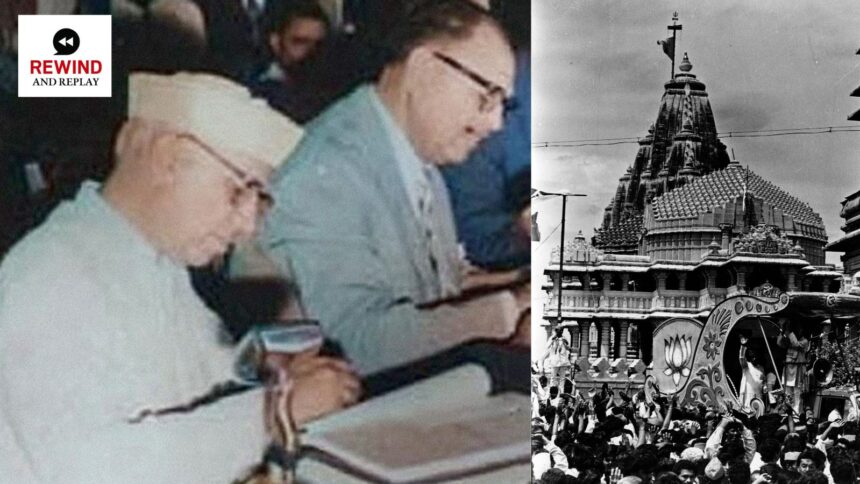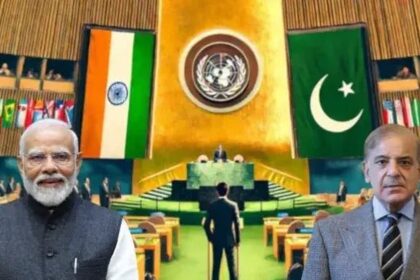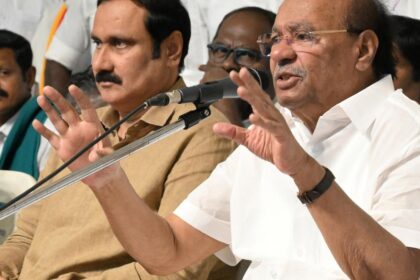Symbolism of the Suspension of the Indus Waters Treaty
The suspension of the Indus Waters Treaty by India following the April 22 Pahalgam attack highlights the unique nature of this pact between India and Pakistan, which has survived three wars and persistent hostility. The river, named after the Indus Valley Civilization, played a significant role in India’s political history shortly after Independence. This was evident in the 1951 reconsecration of the Somnath Temple, which tested the secular principles of the fledgling government of Prime Minister Jawaharlal Nehru.
The trust behind the reconsecration sought soil, flora, and water from across the world to offer at the temple. This included 12 ounces of water from the Indus river from Pakistan. Documents at the National Archives show what followed.
On February 20, 1951, the Jam Sahib of Nawanagar wrote to Khub Chand, the Acting Indian High Commissioner to Pakistan, requesting water from the Indus river. Chand sent a packet containing Indus water a fortnight later to the Ministry of External Affairs (MEA) in Delhi and informed the South Block. The packet was directed to be labelled and sent by air mail to reach the Jam Sahib by March 15, 1951.
The same day, Chand wrote to the Jam Sahib of Nawanagar, informing him that he had sent the water, adding his best wishes for the success of the functions connected with the restoration of the Somnath Temple. In Delhi, Banerji forwarded the Indus water packet to K M Munshi, then Minister of Food and Agriculture, and wrote to Jam Sahib telling him that the latter would carry the water for the installation of the Ling ceremony at the Somnath Temple.
However, the archives show that a week after the Indus water packet was received in Delhi, Chand started worrying about how this may be received in Pakistan. He wrote to Banerji on March 19, 1951, stating that there must be no publicity about the Indus water being sent by the High Commission for India to Pakistan. Such publicity would cause much bitter comment in Pakistan.
Banerji forwarded Chand’s no-publicity request to Munshi, even while asking the Acting High Commissioner, in a letter on March 28, 1951, what possible objection Pakistan could have to Indus water being used in Somnath consecration. Two days later, Chand replied that the Pakistan Government was not going to take any objection but there was likely to be some comment in the Pakistan Press. This may be on the following lines: (a) India ‘pretends’ to be a secular democracy. Yet She indulges in great pomp and ceremony connected with restoration of a temple destroyed by a Muslim conqueror. (b) India has not reconciled herself to Partition. The Indus is no longer an Indian river. It is the lifeblood of Pakistan. The use of Indus water shows that India still considers this river sacred to her.
Chand added that this was a historic occasion for India to restore the Somnath Temple. But he preferred if no mention was made of the fact that the High Commission sent the Indus water. That Indus water was used in connection with the celebration, along with water and earth from various other places in the world, may be modestly advertised if considered desirable.
The issue eventually reached Prime Minister Jawaharlal Nehru, who expressed his disapproval through Foreign Secretary K P S Menon. Menon wrote to Chand on April 25, 1951, saying that the PM wanted to convey that the request for Indus water by the Jam Sahib of Nawanagar "does not have his approval," and that "if any such request is received in the future, you should bring it to our notice before complying with it."
Chand wrote back to the MEA on April 30, 1951, saying that the Indus water was sent through the Ministry of External Affairs so that proper screening of the request could be made if desired. He also made a request that no publicity should be given to the fact that the High Commission supplied Indus water for the consecration of the Somnath Temple.
Chand’s concerns about negative publicity of the consecration ceremony proved valid. On May 21, 1951, a 12-page dossier for the MEA compiled by Deputy Principal Information Officer V R Bhatt detailed reports in the Pakistani Gujarati press accusing India of religious bias and revanchism. Bhatt noted that the Somnath ceremony had become a pretext for intense anti-Hindu and anti-India propaganda.
Reference : https://indianexpress.com/article/political-pulse/indus-river-somnath-pahalgam-india-pakistan-jawaharlal-nehru-9980169/








